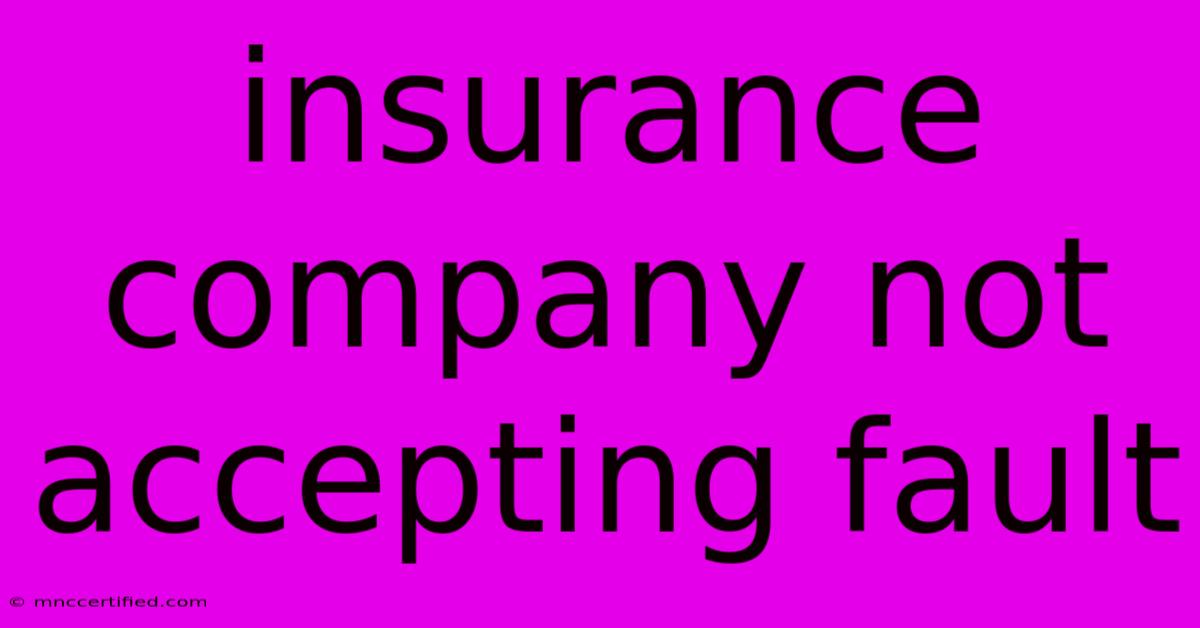Insurance Company Not Accepting Fault

Table of Contents
When Your Insurance Company Refuses to Accept Fault: What You Need to Know
Being in an accident is stressful enough, but when your insurance company refuses to accept fault, the situation can quickly become overwhelming. It's important to understand your rights and options in this scenario, as you may be facing a lengthy and challenging process.
Why Would an Insurance Company Refuse Fault?
There are several reasons why an insurance company might deny fault for an accident. Some of the most common include:
- Disagreement on the Cause: The insurance company may disagree with your account of the accident or believe the other driver is at fault.
- Lack of Evidence: They may argue that you haven't provided sufficient evidence to support your claim.
- Policy Exclusions: Your policy might have specific exclusions that could affect your claim.
- Fraudulent Claims: If the insurance company suspects fraud, they may refuse to accept fault.
What to Do When Your Insurance Company Denies Fault
If your insurance company denies fault, take the following steps:
- Review Your Policy: Carefully review your policy to understand your coverage and any relevant exclusions.
- Gather Evidence: Compile as much evidence as possible to support your claim. This may include:
- Police Report: If a police officer was present at the scene.
- Witness Statements: Get contact information from any witnesses.
- Photos and Videos: Take detailed photos and videos of the accident scene, damage to your vehicle, and any injuries.
- Medical Records: If you sustained injuries, gather documentation from medical providers.
- Communicate with Your Insurance Company: Contact your insurance company and ask for a detailed explanation of why they deny fault. Request a formal denial in writing.
- File a Complaint: If you disagree with their decision, file a complaint with your state's insurance regulator.
- Consider Legal Representation: If you are unable to resolve the issue with your insurance company, consult with a personal injury attorney. They can help you understand your legal options and represent you in any negotiations or legal proceedings.
Tips for Avoiding a Denial:
- Be Prepared: Always carry a copy of your insurance card and driver's license.
- Report Accidents Promptly: Contact your insurance company as soon as possible after an accident.
- Be Accurate and Detailed: Provide your insurance company with a clear and accurate account of the accident.
- Don't Admit Fault: Avoid making statements that could be interpreted as accepting responsibility for the accident.
Navigating the Claims Process
Navigating an insurance claim can be challenging, especially when your insurance company denies fault. By understanding your rights, gathering evidence, and seeking professional assistance when needed, you can increase your chances of a fair outcome. Remember, persistence and a clear understanding of your policy are crucial in these situations.
Keywords: insurance company, deny fault, accident, claim, evidence, police report, witness statements, medical records, legal representation, policy, state insurance regulator, complaint, fraud, coverage, exclusions,
SEO Notes:
This article provides a comprehensive overview of handling an insurance company denial of fault. It addresses common questions and concerns, offering actionable steps and tips for navigating the process effectively. It uses relevant keywords strategically and includes headings and formatting to enhance readability and SEO.

Thank you for visiting our website wich cover about Insurance Company Not Accepting Fault. We hope the information provided has been useful to you. Feel free to contact us if you have any questions or need further assistance. See you next time and dont miss to bookmark.
Featured Posts
-
Is Homeowners Insurance Public Record
Nov 10, 2024
-
Royal British Legion Festival Of Remembrance 2024
Nov 10, 2024
-
Christmas Bonus Dwp Payment Dates And Eligibility
Nov 10, 2024
-
Shanto Jaker Bowlers Power Bangladesh To 1 1
Nov 10, 2024
-
Brighton V Man City Premier League Live Updates
Nov 10, 2024